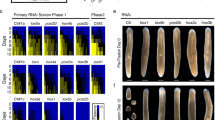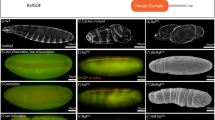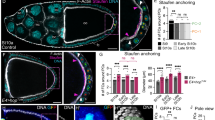Abstract
Several genes have been identified that are involved in establishing the segmented body pattern during development of the fruit-fly Drosophila melanogaster. These fall into several classes on the basis of the kind of alteration to the wild-type segmentation pattern observed in mutant embryos. For example, mutations of the pair-rule1 class, such as fushi tarazu (ftz)1–3 , cause the deletion of pattern elements with a two-segment periodicity; those of the gap class1, such as knirps1,4, cause the deletion of contiguous groups of segments. The availability of antibodies against the ftz protein has allowed its spatial pattern of expression to be studied during the development of wild-type5 and mutant6 embryos. The aim of the latter kind of experiment is to investigate possible interactions between these important genes. We have recently reported that knirps mutations cause a striking alteration to the pattern of transverse stripes of ftz expression usually seen during embry-ogenesis6. Knirps is a zygotically-expressed gene, but recently a class of maternally-active genes has been identified that causes similar defects in pattern formation7–9. We have now investigated the pattern of ftz expression in mutants of this class and have found that while they do have features seen in knirps mutants, they also exhibit significant differences between the different mutations reflecting the distinct but overlapping domains of gene activity. These observations demonstrate that maternally-active segmentation genes regulate zygotic gene expression, and that some of their effects on ftz may be directed through the knirps gene.
This is a preview of subscription content, access via your institution
Access options
Subscribe to this journal
Receive 51 print issues and online access
$199.00 per year
only $3.90 per issue
Buy this article
- Purchase on Springer Link
- Instant access to full article PDF
Prices may be subject to local taxes which are calculated during checkout
Similar content being viewed by others
References
Nüsslein-Volhard, C. & Wieschaus, E. Nature 287, 795–801 (1980).
Wakimoto, B. T. & Kaufman, T. C. Devl Biol. 81, 51–64 (1981).
Wakimoto, B. T., Turner, F. R. & Kaufman, T. C. Devl Biol. 102, 147–172 (1984).
Jürgens, G., Wieschaus, E., Nüsslein-Volhard, C. & Kluding, H. Wilhelm Roux Arch. 193, 283–295 (1984).
Carroll, S. B. & Scott, M. P. Cell 43, 47–57 (1985).
Carroll, S. B. & Scott, M. P. Cell 45, 113–126 (1986).
Schüpbach, T. & E. Wieschaus, Wilhelm Roux. Arch. dev. Biol. (in the press).
Lehmann, R. Thesis, Univ. Tübingen (1985).
Boswell, R. E. & Mahowald, A. P. Cell 43, 97–104 (1985).
Kuroiwa, A., Hafen, E. & Gehring, W. J. Cell 37, 825–831 (1984).
Weiner, A. J., Scott, M. P. & Kaufman, T. C. Cell 37, 843–885 (1984).
Hafen, E., Levine, M. & Gehring, W. J. Cell 37, 833–841 (1984).
Van der Meer, J. M. Drosophila Info. Serv. 52, 160 (1977).
Author information
Authors and Affiliations
Rights and permissions
About this article
Cite this article
Carroll, S., Winslow, G., Schüpbach, T. et al. Maternal control of Drosophila segmentation gene expression. Nature 323, 278–280 (1986). https://doi.org/10.1038/323278a0
Received:
Accepted:
Issue Date:
DOI: https://doi.org/10.1038/323278a0
This article is cited by
-
RNA sequencing of early round goby embryos reveals that maternal experiences can shape the maternal RNA contribution in a wild vertebrate
BMC Evolutionary Biology (2018)
-
Transcription factor AP‐1, and the role of Fra‐2
Immunology & Cell Biology (1996)
-
Organization of anterior pattern in the Drosophila embryo by the maternal gene bicoid
Nature (1986)
-
Pattern formation: Form and diffusion
Nature (1986)
Comments
By submitting a comment you agree to abide by our Terms and Community Guidelines. If you find something abusive or that does not comply with our terms or guidelines please flag it as inappropriate.



